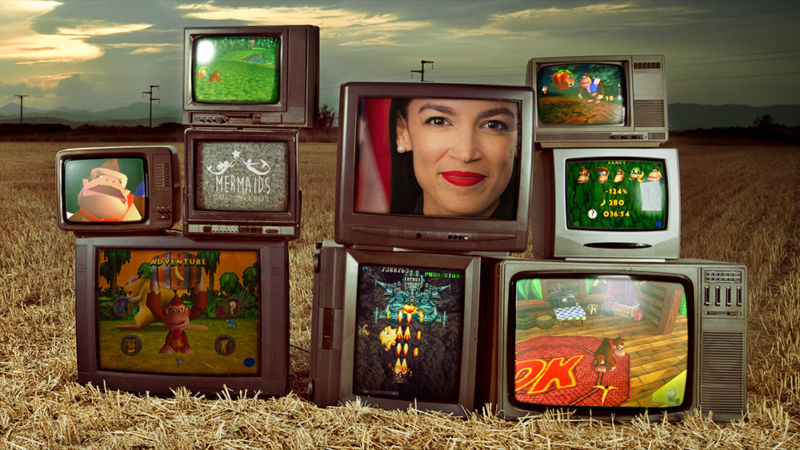
Over the weekend, tens of thousands of people—including one sitting US Congressperson—gathered online to watch a marathon stream of someone playing Donkey Kong 64. The most notable thing about this, perhaps, was just how little organic interest in Donkey Kong 64 actually had to do with much of the gathering.
Let me back up a little bit. The main, ostensible purpose for Harry “Hbomberguy” Brewis’ “Donkey Kong Nightmare Stream” was that he simply wanted to beat Donkey Kong 64, as he put it on YouTube. DK64 was a game Brewis said he “never finished properly as a kid… I want to destroy Donkey Kong 64, so until that has been achieved, the stream doesn’t stop. I don’t care if I fall asleep. I don’t care if I run out of food. The stream will continue.”
But the stream was also set up as a fundraiser for Mermaids, a UK-based gender-dysphoria charity that has recently been criticized by TV writer and comedian Graham Linehan (The IT Crowd, Father Ted). And Brewis was clear that Linehan’s words also served as a direct motivation for the charity marathon.
“I chose Mermaids in specific because when they were designated some funding by the [UK] National Lottery, Graham Linehan… went on Mumsnet and told them to email a lady from the National Lottery en masse and now the funding is under review,” Brewis said. “So well done, Graham! You have a massive audience and the power to choose to fight for progress in all the many forms we need in the world right now and you used it to make sure some children won’t have access to helpful resources.”
Before the game streaming actually started, Brewis had already sailed past his initial fundraising goal of $ 500. As of this writing, after 58 hours of streaming, he has raised over $ 344,000.
Come together, right now, over Donkey Kong 64
If you look back at the start of that marathon streaming session, Brewis and the text-based Twitch chatters watching him are mainly focused on his progress in the game. Throughout Saturday, gaming personalities like John Romero and Jim Sterling made guest appearances to support both Brewis’ quixotic gameplay effort and the charity cause it supported.
As the weekend continued, though, the stream’s charity aspect started attracting more major social media and traditional media attention outside of the gaming realm. As that reach grew, the stream itself and the chat surrounding it became less focused on Donkey Kong 64 itself and more focused on trans rights and other political issues.
That trend reached its zenith Sunday evening when freshman Congresswoman Alexandra Ocasio-Cortez (D-N.Y.) called in to the stream, to Brewis’ amused shock. And the congresswoman made it pretty clear that it wasn’t any particular interest in or knowledge of Donkey Kong 64 that inspired her to show up. “I never owned an N64, though I do think it’s probably the best system out of all of them,” she said on stream. “I used to go to my cousin’s house all the time and he had Super Mario 64, Pokemon Snap, and probably a handful of other things.”
Instead of focusing on the game, Ocasio-Cortez used the charity stream as a platform to address the kinds of political issues that are important to her. “The added layer of discrimination [that trans people face] makes these issues much more acute in these crises then they usually are on average for other people,” she said. “It’s important we do talk about these issues in the economic frame but not let go of the fact that discrimination is a core reason for the economic hardship.”
In and of itself, that’s some pretty stock-standard political speech-making from Ocasio-Cortez. What made the speech a bit surreal was the backdrop of a guy playing a decades-old video game, complete with jangly theme music, as excited viewers typed strings of all-caps chat messages faster than they could be read.
Maybe this is just the modern version of politicians stumping at, say, the Iowa state fair, where they are often forced to pretend they have a deep-seated interest in cow sculptures made of butter, for instance. Savvy politicians have always gone where the people are, and Ocasio-Cortez—who is no stranger to online politicking—sensed that the people tuning in to this charity stream made a good audience for her brand of politics.
That includes those core Brewis followers who were eagerly watching to see his progress in Donkey Kong 64, no doubt. But by the time Ocasio-Cortez came on, it also surely included many more people tuning in primarily to support and discuss trans rights and who would otherwise never seek out video of someone playing Donkey Kong 64 (or any other classic video game). Somehow, in the course of a weekend, this gaming marathon became the impromptu gathering place for a core part of a political movement.
Why we’re all gathered here today
Seeing the stream develop over the weekend highlighted to me the unique ways video games have always created convenient social spaces for people to gather around. This goes back to the golden age of arcades, where games from Pong to Street Fighter II and beyond would gather crowds that could develop into entire communities. In the console era, games like Halo, Super Smash Bros., and countless others provided excuses to just sit on the couch and BS with friends, controller in hand.
In the online realm, a game like World of Warcraft is sometimes criticized for being little more than an “interactive chat room,” where the simplistic gameplay is just something to keep you occupied while you talk with friends. Derisive or not, that kind of description probably captures a large part of why World of Warcraft has been able to sustain itself for well over a decade.
Today, everyone from The Verge to Lifehacker to Quartz has described Fortnite as less of a game and more of a social network in and of itself. For every super-serious Fortnite player looking for that “Victory Royale,” there are probably 10 more just messing around semi-aimlessly while they have a nice chat.

Perhaps more than any other artistic medium, games provide a handy latch point for that kind of casual secondary social interaction. Meeting friends at a concert or a movie or a book reading might offer some opportunities for socializing, but those events often demand too much attention to really allow you to focus on your fellow attendees. The right kind of game, though, can serve as a kind of conversational background noise, not taking too much attention away from your companions while also providing just enough distraction to smooth over any lulls (see also: road trips and sporting events).
In much the same way, Donkey Kong 64 ended up serving as a pleasant, amusing yet easily ignorable backdrop for a weekend-long trans rights fundraiser. Even viewers with next to no interest in the game could appreciate the stream as a focal point that smoothed out the seriousness of the issues being discussed.
We see this kind of thing on Twitch all the time, where the game itself is often secondary to the appeal of the person playing it. Popular Twitch personalities use their streams to carry on live conversations with their viewers about much more than just the game being played, forming a kind of parasocial relationship that can be much more engaging than, say, watching a speedrun on YouTube.
This idea reaches its zenith in Desert Bus for Hope, an annual Twitch charity marathon centered around a game that was literally created to be the most boring game in existence. Somehow, that “boring” game serves as the gathering point for thousands of viewers donating hundreds of thousands of dollars to charity each year. I doubt most of those viewers are tuning in primarily to check out the game.
When people ask me what Twitch is, my default answer is that it’s a place to watch people playing video games. But that’s really an incomplete answer. These days, Twitch is just as often a place where watching video games serves as a convenient excuse to gather with like-minded streamers and viewers in the closest thing we have to a live digital town square.
The game itself is increasingly beside the point. The chance to gather together around the game is what makes these online gatherings special.




